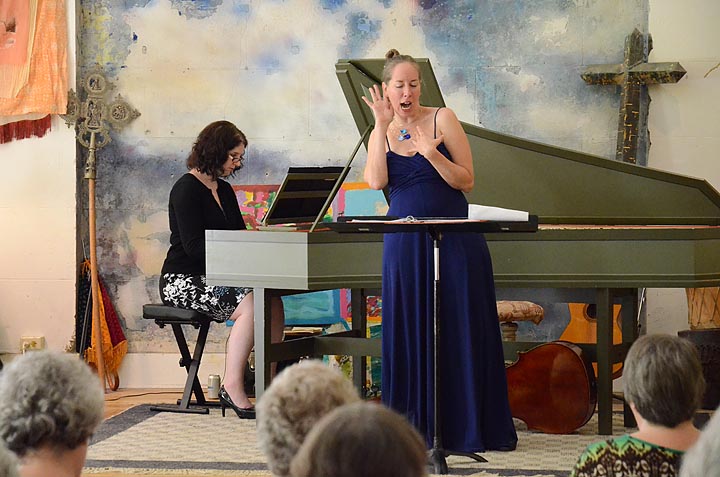by David Kulma

The program began with a Susanne cantata by French composer Élisabeth Jacquet de la Guerre. It tells the biblical story from the book of Daniel where men spy on a bathing Susanna and then blackmail her. Jacquet de la Guerre — who was lucky enough to publish under her own name — wrote gorgeous music to explore not only Susanna’s steadfastness in the face of coercion (despite the problematic text praising Susanna’s willingness to be wrongfully executed) but also the men’s impious pleading and threats. Rauschenfels brought forth her signature vocal dexterity: a combination of emotional intensity, precise musicality, and overt theatricality that draws an audience in. Maust contributed excellent playing and a cool presence.
The next vocal set paired two Italian arias by Giulio Caccini and one English song by John Eccles — all exploring different power imbalances between a man and a woman. Deh chi d’alloro is a bass aria declaring a man’s success in violently wearing down a woman, while the man in Con le luci d’un bel ciglio complains of “assault” from seeing an aloof, beautiful woman. There lately was a maiden fair tells the fate of a poor woman seduced by a self-proclaimed lord in a park at night.
Rauschenfels was again technically perfect while turning the basso character into a bumbling, bloviating Dottore from commedia dell’arte, and her low-born English lass had a disturbing, spot-on authenticity. Maust’s alternating dancing figures in Con le luci gave this bouncing music a vivacity underpinning Rauschenfels’s bright vowels.
Maust interspersed several harpsichord character pieces between vocal sections of the program. Jean-Philippe Rameau’s L’Indifférente and L’Indiscrète both have titles that could have described women who were unavailable or unconstrained. Four pieces from François Couperin’s Quatorziéme Ordre all focus on amorous birds. In the program notes, Maust writes that the works might refer to an unconventional Duchesse who is the loving female subject of this music rather than the usual powerless object. Maust played all of these lovely binary dances with great finesse and control.
The final cantata by Philippe Courbois brought out Rauschenfels’s five-string Baroque cello, making Apollon et Daphné a sonorous trio. Courbois’s telling emphasizes Apollo’s unrequited love, while Rauschenfels’s introduction showed a clear identification with Daphne, who is turned into a tree to escape the dangerous god. The ease with which Burning River Baroque took an 18th-century French cantata on a Greek myth and connected it to our fraught political moment was astounding — all the more so because they performed with such grace, polish, and bountiful skill and passion.
They ended the evening with the glorious Sephardic song Noches, Noches, Buenas Noches exploring the various emotions of young girls on their wedding day. For this writer, this concert confirmed that any future Burning River Baroque event is a must-attend — not only for the fantastic music, but the important thoughts the ensemble inspires.
Published on ClevelandClassical.com October 29, 2018.
Click here for a printable copy of this article


